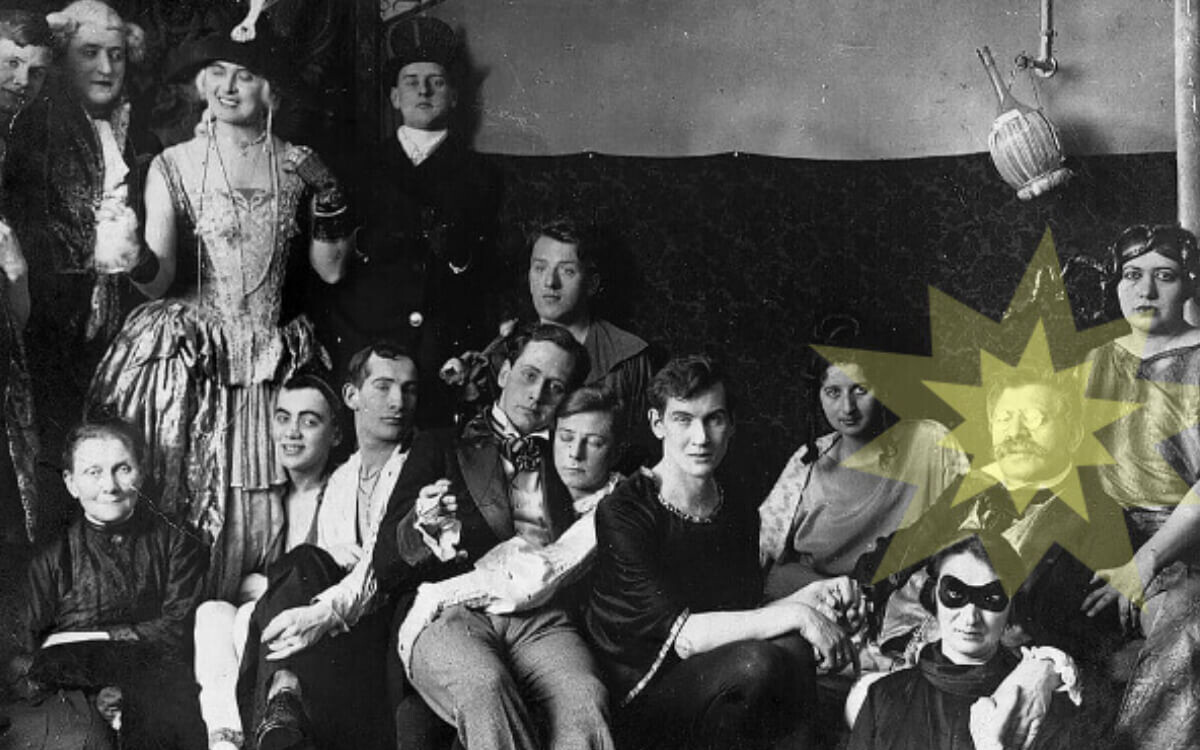Many people immediately think of the events on Christopher Street and at the Stonewall Inn when they think of the gay rights movement. What few know: The scientific debate on homosexuality and gender and the fight for their rights began much earlier. With the German physician and sexologist Dr. Magnus Hirschfeld (* 1868; † 1935), an early advocate of gay and transgender rights.
Jew, homosexual, scientist & pre-cancer
Magnus Hirschfeld was born into a Jewish family in Kolberg, in what is now Poland. Studied medicine in Strasbourg, Munich, Heidelberg and Berlin, where he finally obtained his doctorate in 1892. After founding the student association Badenia Heidelberg (one of the founding associations of the Kartell-Convent of the associations of German students of the Jewish faith) and a naturopathic and general medical practice in Magdeburg, Magnus Hirschberg finally moved to Charlottenburg near Berlin.
During this time he developed the idea of the universality of homosexuality. Decisive were his insights into the gay subcultures in Chicago, which he compared with those in Berlin. In addition, the trial of Oscar Wilde and the gay patients he treated, many of whom were suicidal, had a strong influence on him. In 1896, he published a pamphlet entitled “Sappho and Socrates”. It is the only writing he ever published under a pseudonym.
Scientific Humanitarian Committee – First organisation for homosexuals
In 1897, Magnus Hirschfeld, together with the well-known publisher Max Spohr, the writer Franz Joseph von Bülow and the lawyer Eduard Oberg, founded the Scientific Humanitarian Committee (WhK for short), the first gay rights organisation ever to campaign for the repeal of Paragraph 175, the law that criminalised homosexuality in Germany. The organisation’s aims also included promoting public education about homosexuality and encouraging homosexuals to stand up for their rights.
In 1904, there was a rift between the WhK and Hirschfeld due to a survey on sexual orientation. Hirschfeld founded the “Zeitschrift für Sexualwissenschaft” in 1908. In the context of the Harden-Eulenberg affair, his opinion met with homophobic and anti-Semitic backlash. Hirschfeld advocated the natural birth of queer people and emphasised the connection between gay rights and feminism. He disagreed with colleagues who wanted to publicly out famous Germans.
His Dr Magnus Hirschfeld Foundation (now the Federal Magnus Hirschfeld Foundation), founded in 1918, is regarded as the basis for a truly pioneering achievement. Namely, the establishment of scientific sexual research in Germany in the form of a separate institute.
Hirschfeld opened the Institute for Sexual Science in 1919 in the liberal Weimar Republic. It included a library on homosexuality, medical services and gender reassignment surgery. The institute also financed the film “Different from the Others”, in which Hirschfeld was involved.
Shadow of National Socialism – Hirschfeld’s Flight and Exile
The rise of the NSDAP led to the end of Hirschfeld’s academic work on homosexuality in Germany. In the 1920s, Magnus Hirschfeld was repeatedly the victim of hostility. Including physical hostility, which even led to domestic and foreign media announcing his death. The smear campaigns, especially in the National Socialist diatribe “Stürmer” gained in intensity and Schlägertrupps disrupted his speeches.
Because he was no longer safe, Magnus Hirschfeld left Germany in 1931 for a worldwide lecture tour and never returned to Germany. He made a stop in the United States, where he was called and celebrated as the Einstein of sex. Ménage à trois until Hirschfeld’s death.
Both partners were appointed as sole heirs by Magnus Hirschfeld. Karl Giese committed suicide in 1938 at his last residence in Brünn. Li Shui Tong died in Vancouver in 1993 at the age of 86. . The Hirschfeld legacy given into Giese’s hands was lost in the turmoil of the Second World War. What remained was made accessible to science or the public. For example, parts of Li Shui Tong’s legacy, such as a testament in the form of a diary from the years 1929-1935, were given to the Magnus Hirschfeld Society.
During Hirschfeld’s French exile, the National Socialists plundered the Institute for Sexual Research and burned his extensive book collection. Hirschfeld died unexpectedly in 1935, serving the Nazis and their propaganda as a prominent symbol of the degenerate Jew even after his sudden death. The last book by Magnus Hirschfeld, published a few years after his death, attracted much attention. Its content was a comprehensive indictment of racism in Nazi Germany and throughout European history.
Implications of the work of Magnus Hirschfeld
When one considers the temporal and social circumstances in which Magnus Hirschfeld not only dealt with the subject of homosexuality scientifically, but also campaigned for the rights of homosexuals and transgender people, his achievement can hardly be adequately acknowledged. For example, he had a great influence on the emergence of the gay rights movement in the USA. For example, Eric Marcus, a US author who published the book Making Gay History in 1992, in which he reviews the development of the LGBTQIA+ civil rights movement, apologises for not even mentioning the name of the German scientist Dr. Magnus Hirschfeld in his work.
Magnus Hirschfeld published numerous books in the field of sexual education. Such as “Geschlechtsübergänge”, which was dedicated to the topic of a third sex. His important works also include a research paper in which he used the term transvestite for the first time, thus creating a term for this group of people that is still valid today. Today, his most important work is considered to be his “Sexual Pathology”, a textbook consisting of three volumes.
|
